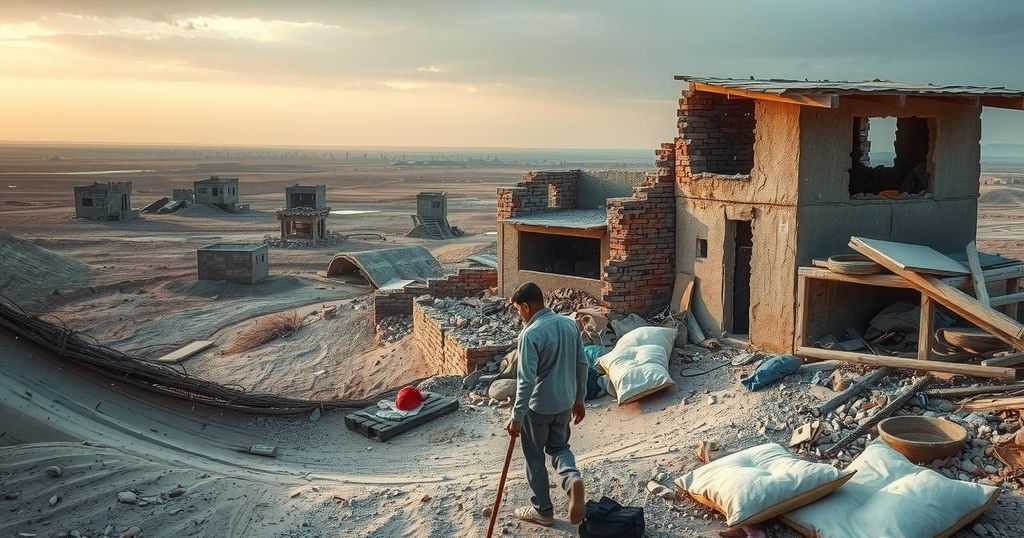The conflict in the Democratic Republic of Congo, driven by M23 rebels supported by Rwanda, has led to widespread devastation, displacement, and suffering among families. Victims, like 13-year-old Heshima, have lost loved ones and faced brutal injuries, illustrating the human toll of the violence. Promises of peace from the rebels stand in stark contrast to the real fears of the local population, who face uncertain futures amidst the ongoing crisis.
In the eastern Democratic Republic of Congo, the humanitarian crisis intensifies amidst the ongoing conflict led by M23 rebels. These rebels, supported by Rwanda, have instigated significant violence, resulting in the devastation of families and the displacement of thousands. One victim, 13-year-old Heshima, now faces life with a severely injured leg and the loss of both parents due to the violent clashes between the M23 and the Congolese army, known as the FARDC.
Relative Tantine recalls the horrors of a recent attack, stating, “There was fighting between them and the FARDC. They dropped the bomb, and I lost six members of my family.” The M23, which is predominantly composed of ethnic Tutsis, has expanded its territorial control aggressively since early 2022, allegedly with the aid of approximately 4,000 Rwandan troops, though Rwanda’s government denies such involvement.
The conflict has led to overwhelming casualties and sent numerous civilians to already overcrowded hospitals like Ndosho Hospital in Goma. The medical staff has been stretched thin, treating up to 150 patients per day during times of intense fighting. Myriam Favier from the International Committee of the Red Cross notes that staff have even slept in operating theaters due to the overwhelming nature of the crises they face.
Despite the menacing presence of the M23, the streets of Goma show signs of life, with shops and markets reopening. However, local residents speak of a pervasive fear and the need for self-censorship, as many await to understand the behavior of their new rulers. One local activist expressed, “This is the most worrying period of Goma’s history,” highlighting the sense of uncertainty that looms over the community.
The M23 claims to offer promises of peace and prosperity. Vice-governor Willy Manzi asserted that they aim for “zero refugees, zero corruption, zero hunger.” Meanwhile, the displaced population faces an ultimatum from the M23, which threatens them to vacate camps established due to previous unrest, declaring they must leave within 72 hours.
Divine, a young mother living in Bulengo camp, articulates the grave concerns of the displaced communities: “We were very scared because we have nowhere to go. Our houses have been destroyed.” Many residents, responding to the ultimatum, began to dismantle their fragile homes in the camps, which they once relied upon for shelter.
Human rights organizations have condemned the M23 for patterns of violence and abuses, echoing similar accusations against the Congolese army. The conflict traces its roots back to historical tensions following the 1994 Rwandan genocide, which spilled over into DR Congo and involves complex geopolitical struggles over the region’s mineral wealth.
Amidst the tragedy, Alphonsine, another camp resident, summarized their plight with poignant clarity, stating, “I came from suffering, and I leave in suffering.” As families are forced to uproot their lives, the toll on the local population continues to grow, and concerns for future stability remain paramount.
The ongoing conflict in the Democratic Republic of Congo presents a grave humanitarian crisis, as M23 rebels, backed by Rwanda, continue to disrupt lives and cause widespread displacement. Victims like Heshima and the displaced families from camps highlight the suffering resulting from the violence. Despite claims of peace from the M23, the fears of local residents underscore the uncertainty of the region’s future amidst historical tensions and the exploitation of mineral resources. The humanitarian situation remains dire, calling for urgent attention and intervention.
Original Source: www.bbc.com






